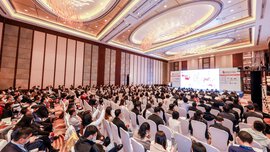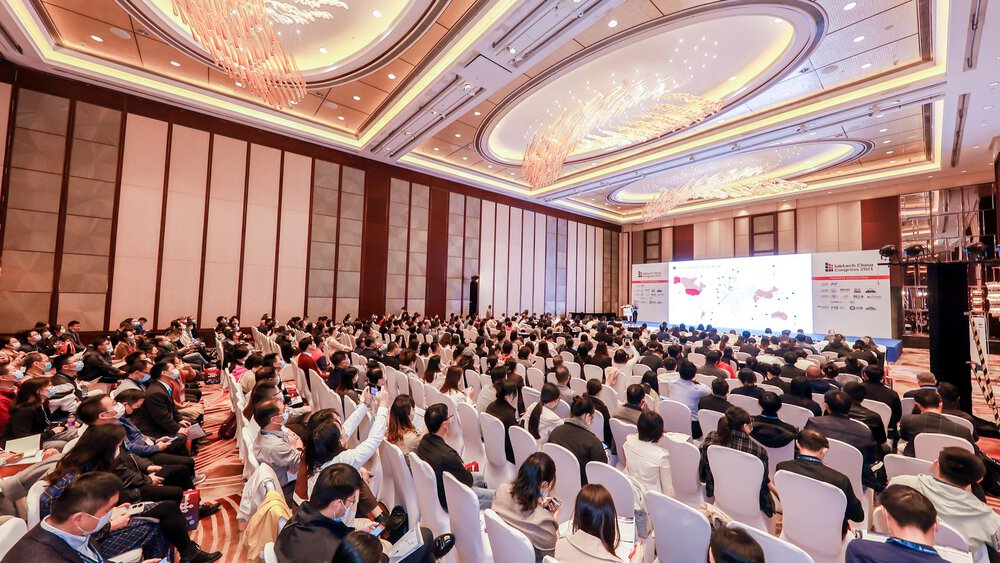labtech China Congress 2021 Interprets Future Sustainable Laboratories
November 17, 2021
On October 22, the two-day labtech China Congress 2021 came to a successful conclusion at the Kerry Hotel Pudong, Shanghai. The congress is organized by Messe Muenchen Shanghai Co., Ltd., a wholly-owned subsidiary of Messe Muenchen, and co-organized by Tongji University, International Laboratory Construction and Evaluation Magazine, Shanghai Zhangjiang Bio-tech & Pharmaceutical Base, Shanghai Pudong Bio-Industry Association and Scientific Equipment and Furniture Association (SEFA), USA.
labtech China Congress 2021 is created by analytica China, the beacon exhibition for the laboratory industry in the Asia-Pacific region. It focuses on the promotion of advanced laboratory planning, construction and management in China and the world. It values the harmonious connection between people and laboratories, as well as the innovations and transformations of sustainable labs in this age of Big Health. 82 famous experts, scholars, architects, and laboratory experts gave insightful speeches on eight the most important issues in the laboratory. Well-known Chinese and international companies and brands displayed innovative technologies and products in the Live Labs and exhibition spaces. A total of 1,919 professional delegates from the laboratory industry contributed to the grand event.
Mr. Stephen Lu, Chief Operating Officer of Messe Muenchen Shanghai Co., Ltd., commented: "This is the second time that the labtech China Congress has been held independently of analytica China. The congress has made it to a new level both in size and quality, and has received very positive feedback from all the participants. It provides all-round learning and communication opportunities for laboratory planning and construction. The end users, planners and construction units can have dialogues on different levels here. I hope labtech China Congress 2022 will attract more end users, lab management and decision-makers. So they can talk face to face with people from the planning, designing and construction side. Together they will develop high-quality one-stop solutions to future labs. We will take a different positioning next year, as we always do, and focus on the end users to make labtech China Congress larger, more specialized, and stronger!"
High-quality Summits Directs to Future Sustainable Labs
labtech China Congress 2021 focuses on a myriad of topics: scientific facility construction and laboratory design and planning, laboratory construction, operation and maintenance under the world/China technology innovation system, smart laboratory design and planning, smart laboratory efficiency and management. Experts from the Chinese Center for Disease Control (CDC), China National Accreditation Service (CNAS), Chinese Academy of Sciences, Panjin Inspection and Testing Center, HOK Architects, Huajian Group Shanghai Architectural Design and Research Institute, China IPPR, Sinopec Shanghai Engineering, Shenkang Hospital, Green Valley Pharmaceutical, Shanghai University of Science and Technology, Peking University International Hospital, New York University Shanghai, University of California, Irvine School of Sustainable Development, Fraunhofer-Gesellschaft, Hanguang, San Group, WALDNER, Agilent, and Perkin Elmer spoke about the lab construction requirements and standards at home and abroad, and inspired in-depth thinking about laboratory construction and management through their sharing of innovative trends and case studies in the planning, construction and management of smart laboratories. They gave clear directions to the sustainable development of laboratories in the future. In addition, labtech China Congress adopted a brand new roundtable forum that promoted exchange across disciplines—design and planning suppliers, construction contractors, EPC general contractors and users- on how to build high-level biological laboratory that is demanding in many aspects. The talk was heated and participants reported positive experience.
Mr. Li Zhuxuan, Senior Chief Engineer of China IPPR International Engineering Co., Ltd. said: “In the past, biosafety almost entirely relies on visual instruments. Now we can monitor and manage equipment remotely through smart systems. Data systems and Big Data technology can support high-performance laboratories such as biological laboratories and high-level laboratories in terms of safety, capacity, efficiency, and management. I think this is very good. Such trend is also what design and construction units are concerned about. I think the organizers of labtech China Congress have done a good job. From policy, laboratory management, design, architecture to electromechanical and even products, manufacturers and the cooperation between industry and academic research like the Tongji University team, as well as the case studies, they all give very inspiring ideas. I would give the organizer a thumb-up and hope the congress will be even better in the future."
Mr. Lin Yifan, Special Assistant to the General Manager and Director of the Planning and Construction Department of Shanghai Green Valley Pharmaceutical Co., Ltd. said: "I can see that the exhibitors and participants are all very supportive to labtech China Congress. The lecture topics are very important and in-depth discussions are made on many aspects from biology and chemistry, to industry standards and national regulations from the perspective of users. I believe this is very helpful to the audience. This is the second time I participated in the labtech China Congress. I think that the size and quality have been greatly improved. I suggest that in the future, we could hold more special workshops focusing on more specific topics. I believe such events will be very helpful."
Four Parallel Sessions on Safe, Smart and Sustainable Labs
The parallel session Sustainable Laboratory (1): Laboratory operation and maintenance and evaluation under the goal of carbon neutrality and carbon peak focused on the important role of the LEED system in sustainable laboratory design and planning, the application of new materials in laboratory construction, sustainable laboratory safety education and personnel training, and ways to achieve "carbon neutrality" in laboratory design and construction. Experts from Shanghai Pacific Energy Center, Road, Tongji University and TERAO France offered insights into the development of sustainable "carbon-neutral" laboratory that is cost-reducing, efficient and environmental from the perspective of lab operation, maintenance and evaluation.
The parallel session Laboratory Environment and Safety is presented by industry and business representatives from the National Health Commission, the National Ministry of Ecology and Environment, Schneider Elektronik GmbH, San Group, China IPPR International, and the Chinese Academy of Sciences. They discussed important topics such as chemical pollution and occupational health in laboratories, laboratory hazardous waste management, the design and application of variable air volume control systems in laboratories, intelligent management and control of hazardous chemicals throughout the life cycle, the fundamental role of design in the safety of advanced biological laboratories, the safety of bio data and network facilities. The session conveyed an important concept of Labtech China Congress—the protection of research personnel and harmonious relationship between human and laboratory.
The parallel session Sustainable Laboratory (2) International perspectives on sustainability, digitization and intelligence addressed issues like new trends in sustainable laboratory design and planning, future-oriented flexible laboratories, preliminary planning of scientific research facilities and real estate, active heat recovery- the future of fresh air-conditioning in laboratories, the effective route of achieving “dual-carbon goals” learned from international sustainable laboratories. Senior experts from Dyna, Perkins & Will Architects, QED Environment, Konvekta AG, and the National Renewable Energy Laboratory (NREL) of the U.S. Department of Energy talked about advanced design, construction and management concepts that can inspire its Chinese peers, and promote the improvement of Chinese scientific research, education, environmental monitoring, testing, medical and other experimental activities.
The parallel session Digitalization and intelligence, the future of the inspection and testing industry focused on the AI interpretation of big inspection data, the development and challenges of medical device inspection and testing in China and abroad, and the digital intelligence services in the new testing lab infrastructure construction, remote review in laboratory accreditation, the construction and acceptance of smart laboratories, the digital transformation and platform building of third-party inspection and certification agencies. Industry representatives from Shanghai Changhai Hospital, Shanghai Medical College, iLabService Technology, CNAS, CTI and China Certification & Inspection Group (CCIC) spoke about the orderly, healthy and sustainable development of inspection and testing institutions and their bright future, following the the state’s policy of “delegating, managing and serving”.
As an important part of the support programs of the labtech China Congress 2021, the Workshops offered a more detailed introduction to the concept of lab sustainability through lectures and training sessions, focusing on the lab space, operation and maintenance, and the planning and design of sustainable laboratories. From the designer's point of view, they gave new insights into lab construction. The Workshops also discussed laboratory environment and safety, food safety and inspection automation, and emphasized using high-tech methods to improve the safety of the laboratory and the personnel. Participants discussed how to build a sustainable laboratory and improve laboratory environment and safety.
Downloads
550420
Belonging images


- Project Manager

- Media contact

